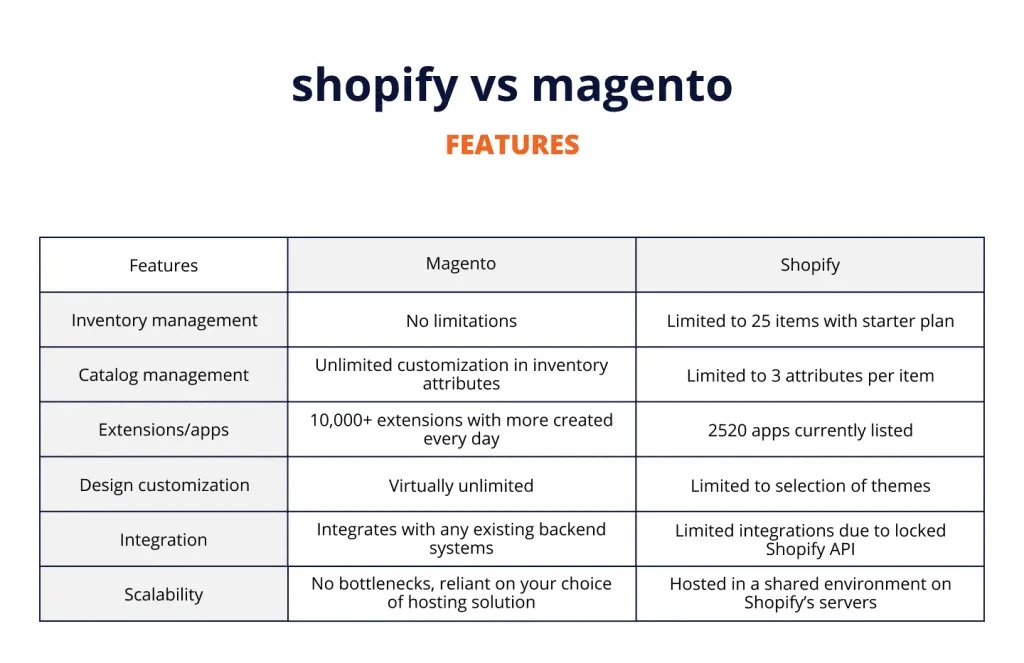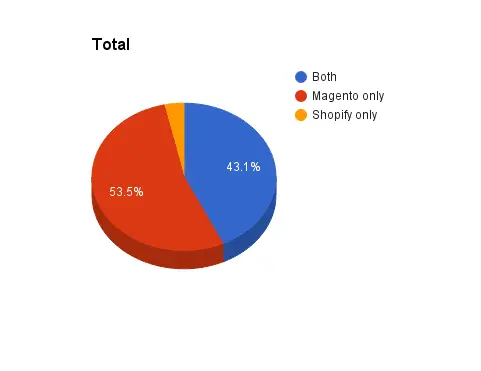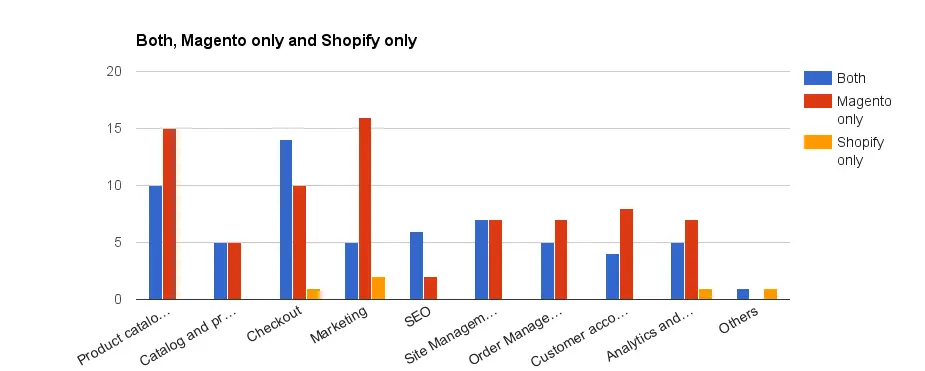11 reasons to choose Magento over Shopify

Magento offers a highly flexible platform that allows the website owners to create several functions and comes with an array of features that makes it the more preferred E-Commerce platform for the online businesses. We have come up with a quick comparison guide for any merchants looking to make this decision.

Here are some solid reasons to pick Magento over Shopify
1. Speed and Performance:
The speed with which any website loads determines its success rate. If one compares Magento 2.0 with Shopify, The performance of Magento is relatively better compared to Shopify because of its advanced cache mechanisms and CDN setup. In Magento 2 the overall performance of the site has been the key factor and was highly optimized.
2. Scalability & Flexibility:
Magento Commerce is more flexible than Shopify Plus. Some of the explanations could be that Magento uses PHP((e.g Facebook) supported by 205,000 developers worldwide.) and is an open-source and self-hosted platform. You have the possibility to have access to the technology stack, to set up multiple languages and multiple currencies. There are so many options available that is sometimes hard to navigate. Keeping the future progress of the business in vision, Magento is built to scale from 1 to a million users. The Magento integrates with all existing applications (e.g. CRM, CMS) and systems (e.g. ERP, PIM, AMS) while Shopify has limited access to other business Process.
Magento also has been named as a leader by Gartner Inc. in Magic Quadrant for Digital Commerce.

3. Multi-Store Management:
Multi-Store Management: Multi-store is one of Magento’s key selling points, allowing merchants to manage multiple brands, regional stores and B2B / B2C stores from one Magento interface whereas in Shopify you don’t have complete control to manage multiple instances effectively.
4. Internationalisation (multi-currency, multi-warehouse etc):
Magento’s ability to allow the user to manage all components of individual stores (such as specific attributes, stock, the catalog etc) at a global level is a huge advantage, whereas Shopify Plus would have separate stores (clone stores) which would need to then be updated/managed individually.
5. Merchandising:
Magento 2 Enterprise / Commerce does have a visual merchandising solution, which is based on the previous OnTap Visual Merchandiser extension (which they acquired a few years ago and build into the M2 core), allowing merchants to visually sort products in specific categories. This solution is stronger than what is offered by Shopify Plus, but it’s not great still and is light years behind Demandware / Salesforce Commerce Cloud’s Einstein solution (which allows for complex rule-based merchandising and is built around machine learning).
6. Third Party Integrations, Extensions and Apps:
When it comes to flexibility, Magento is the clear winner. Shopify with a little over 100 apps and Add-ons comes nowhere near Magento which provides more than 5000 extensions to its clients owning no doubt to the open source nature of the platform.
7. Web design/Customization:
Both Shopify and Magento provide you with the facility to build your websites from scratch choosing from various themes available which are highly responsive with robust customization capabilities.
The difference lies in the usability, where Shopify works on the drag and drop philosophy enabling easy theme customization, Magento with the help of Bluefoot (a CMS and page builder module) enable clients to build a uniquely designed website.
8. SEO:
The main reason why to opt the Magento platform for eCommerce web development is because of its SEO friendly nature. The higher traffic is drawn simultaneously results in the best rankings on different search engines.’Magento SEO’ has solved multiple issues by facilitating better optimization of the e-commerce site. According to research performed by ecommerce-platforms.com.
9. B2B / Wholesale Capabilities:
B2B is a huge focus for Magento currently and the new module comes with a lot of strong features, such as the ability to manage quotes, create customer-specific catalogs, manage various settings against customers, assign roles to users, assign budgets to users and companies etc. This is a big strength of Magento over Shopify Plus. With Shopify Plus, a lot can be achieved, but only via third-party apps and the platform is generally not as proven in this area.
10. Community:
The almost undoubtable biggest selling point of Magento is the community, as mentioned above – there are thousands of skilled, experienced Magento developers out there capable of helping you build and maintain Magento stores at all levels.
11. OTTB Features:
If we are comparing the out of the box features of Magento with Shopify, We can say Magento is way ahead with over 50% exclusive OOTB features.


Conclusion:
While both Magento and Shopify are powerful e-commerce platforms, when you want to build a complex system with next level of features likes order management system, B2B you cannot choose Shopify as this is very much built for the merchants with core e-commerce features with fewer integrations. This is the key reason why Magento has the most customers in the “Internet Retailer Top 1,000 List” because it provides stability and performance as businesses scale, integrate systems, and get strategic about data.
We at Sigma assist our customers with tailor-made solutions for Magento. Learn more about our Magento capabilities and how we can help online merchants.

